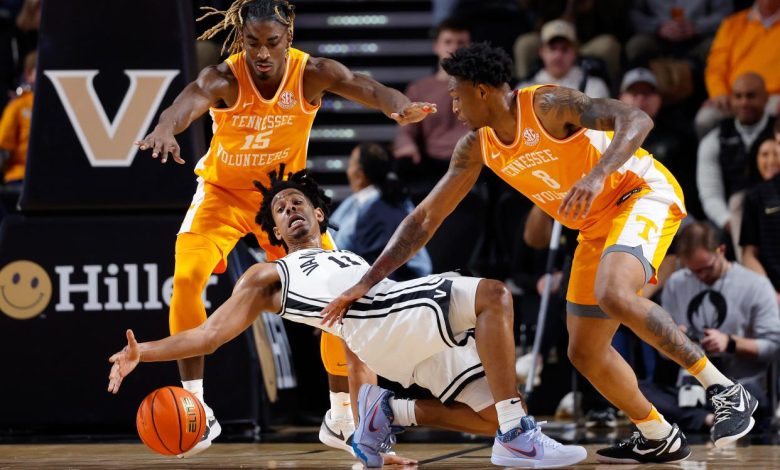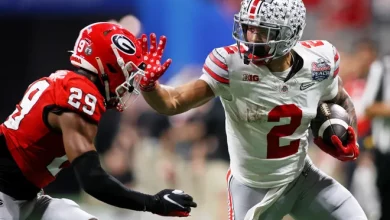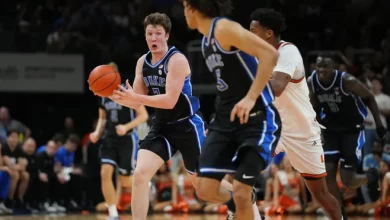Three Things to Remember After Vanderbilt Basketball’s Disappointing Loss to Tennessee No. 5

Vanderbilt basketball’s recent loss to the No. 5 Tennessee Volunteers was a tough pill to swallow for the Commodores. After leading by 13 points at halftime, Vanderbilt faltered in the second half, eventually losing 81-76. The game, which had all the promise of an upset, instead served as a reminder of some of the ongoing challenges the team faces. There were several critical moments during the game that helped define the outcome, and as Vanderbilt looks ahead, three things stand out that must be addressed moving forward: maintaining consistency throughout the game, improving defensive execution, and finding reliable scoring options beyond the star players.
1. Inability to Maintain a Lead: Second-Half Collapse
The Commodores began the game with a lot of promise, playing aggressively and efficiently, which allowed them to build a comfortable 44-31 lead at halftime. Vanderbilt’s offense was flowing well, and their defense was solid, limiting Tennessee to just 31 points. The team was able to hit shots from the outside, create turnovers, and keep Tennessee’s high-powered offense at bay. However, things took a turn after the break. Tennessee, as a top-five team, is known for their resilience, and they quickly began chipping away at the deficit. The Volunteers found their rhythm offensively, shooting a blistering 65.4% from the field in the second half.
Vanderbilt, on the other hand, struggled to find the same level of execution in the second half. They shot just 35.7% from the field after halftime, which is far below the standard they set in the first 20 minutes. As the game went on, Vanderbilt seemed to lose its poise, unable to match Tennessee’s intensity. The Volunteers were able to impose their will, slowly creeping back into the game and eventually overtaking the Commodores for the win.
This inconsistency between halves has been a recurring issue for Vanderbilt. In a game that appeared to be within their grasp, the Commodores failed to execute when it mattered most. Whether it was missed shots, turnovers, or lapses in defensive intensity, Vanderbilt’s inability to maintain the lead highlights an area that needs significant improvement. As the season progresses, finding a way to play a full 40 minutes will be crucial for the Commodores. Against elite teams like Tennessee, a strong first half is not enough unless you can back it up with similar performance in the second half.
In many ways, this loss serves as a microcosm of Vanderbilt’s struggles against top-tier competition. They have the talent and the ability to play with some of the best teams in the country, but it’s often the case that they falter in the latter stages of games. Whether it’s fatigue, lack of focus, or tactical adjustments, these lapses are costing them valuable wins. The coaching staff and players must address the issue of second-half execution and find ways to close out games effectively.
2. Defensive Adjustments and Rebounding Woes
One of the most glaring issues that emerged from the game was Vanderbilt’s inability to stop Tennessee’s offense when it mattered. While they did a good job limiting the Volunteers in the first half, they were unable to make necessary defensive adjustments in the second half. Tennessee’s offensive players—particularly their forwards and wings—found open looks, and the Commodores struggled to keep them out of the paint or contest shots. This lack of defensive intensity allowed Tennessee to score 50 points in the second half, nearly doubling Vanderbilt’s 26 points in the same period.
Additionally, rebounding played a pivotal role in the game’s outcome. Tennessee dominated the boards in the second half, out-rebounding Vanderbilt 20-10. This discrepancy in rebounding made a huge difference in Tennessee’s ability to extend possessions, leading to more opportunities for scoring. Despite having the size and athleticism to compete on the glass, the Commodores simply could not match Tennessee’s tenacity and physicality inside. Rebounding is a crucial aspect of defense, as it limits the opponent’s second-chance points and helps a team gain momentum on offense. When a team gives up multiple offensive rebounds, as Vanderbilt did in this game, it allows the opponent to gain confidence and rhythm.
Tennessee’s rebounding advantage directly contributed to their ability to chip away at the deficit. They grabbed critical offensive boards in the second half, including a few late in the game that led to easy putbacks or foul opportunities. Vanderbilt has been inconsistent in terms of their defensive rebounding throughout the season, and this game highlighted just how important it is for them to secure the ball off the glass, particularly against teams with physicality and depth.
Defensive adjustments, especially against teams with a high-powered offense like Tennessee, are also an area where Vanderbilt could improve. The Commodores struggled with ball screen defense and rotations in the second half, allowing Tennessee to generate open shots. Part of the reason why Tennessee’s offense exploded in the second half was because Vanderbilt’s defense failed to execute its assignments, allowing easier scoring opportunities. Going forward, improving communication on defense and tightening up on the glass will be critical to securing wins in close games.
3. Need for Scoring Consistency Beyond the Stars
While Jason Edwards was outstanding in the loss, leading all scorers with 24 points, including six three-pointers, the team was unable to generate consistent scoring from other players. Edwards, who has been a key player for Vanderbilt all season, was excellent in the first half and kept the Commodores in the game when Tennessee started to heat up. His ability to knock down shots from long range and get to the basket was a bright spot for Vanderbilt, but he couldn’t carry the load alone in the second half when the team needed more support.
Jaylen Carey added 18 points and seven rebounds, providing some secondary scoring, but beyond these two players, Vanderbilt struggled to find reliable offensive options. Guys like Tyrin Lawrence and Colin Smith, who have shown flashes of brilliance throughout the season, were largely quiet in this game, contributing only minimal points. When only a few players are stepping up on offense, the opposing defense can focus on those key players and limit their impact. This was evident in the second half, as Tennessee adjusted to Edwards and Carey, forcing others to take on bigger roles, but they couldn’t rise to the challenge.
This lack of scoring depth is something Vanderbilt needs to address. In order to be competitive against top teams, the Commodores need to find ways to generate offense from multiple players, especially when the defense focuses on shutting down their star performers. Teams that rely heavily on one or two players to score often struggle to win consistently, as opponents can scheme to limit those players’ effectiveness. Vanderbilt must develop more balanced offensive attacks, ensuring that other players can step up and contribute when needed. Whether that means getting more scoring from the bench or developing a more diversified offense, finding consistent scoring from other players will be key for the Commodores as they move forward.









